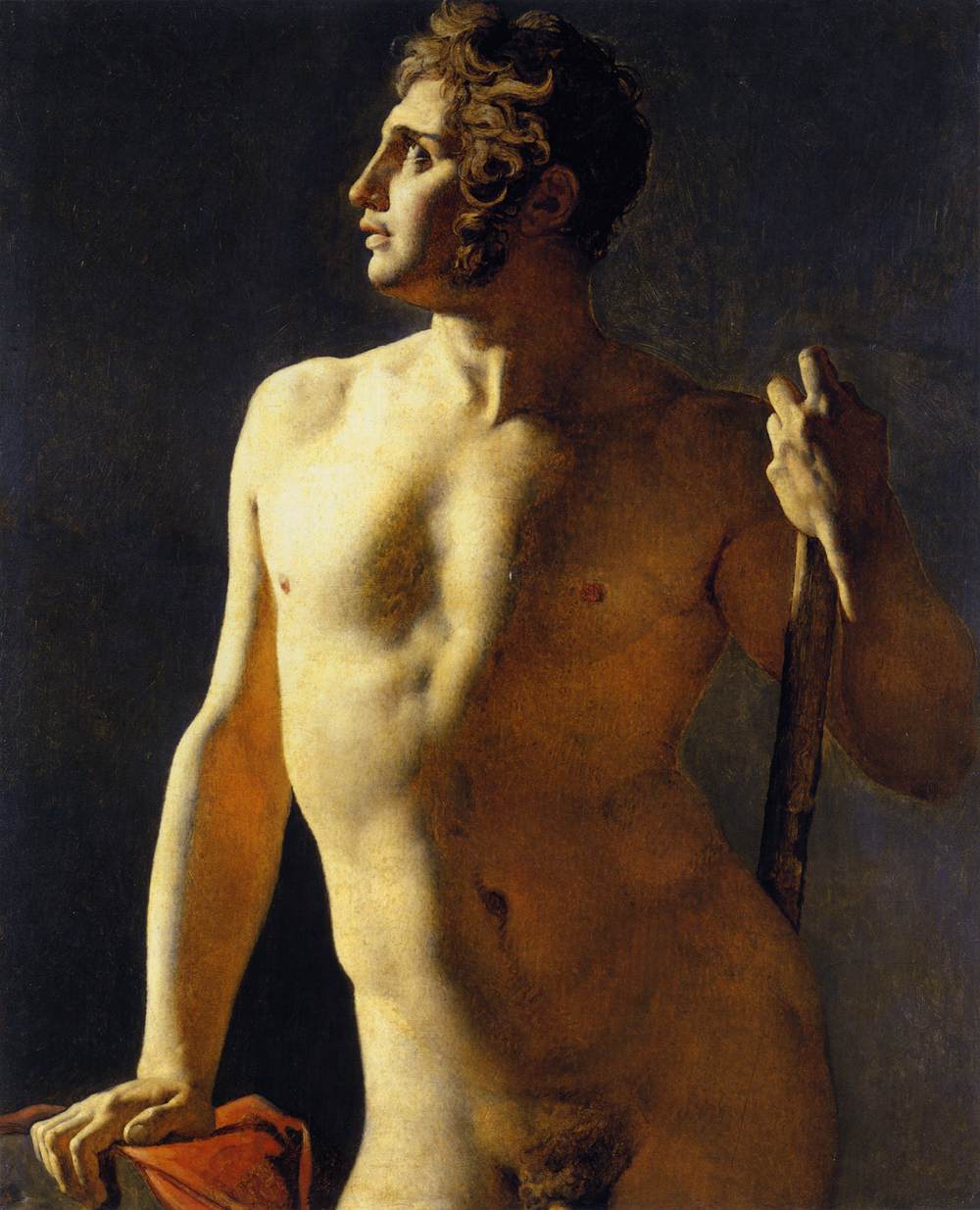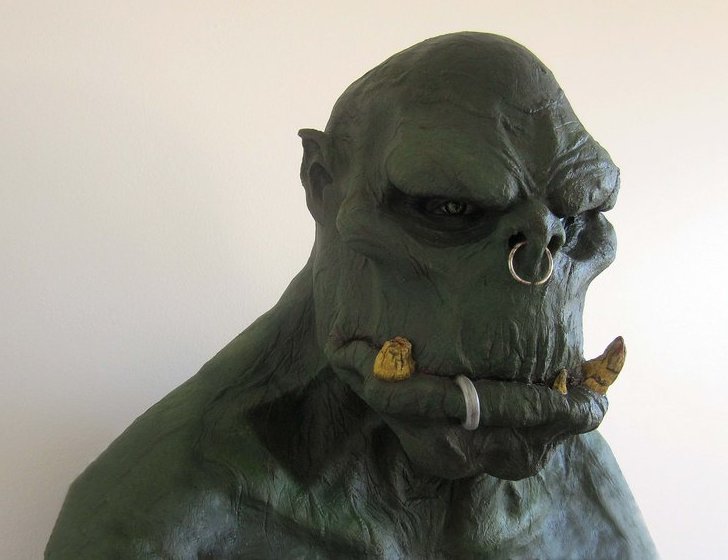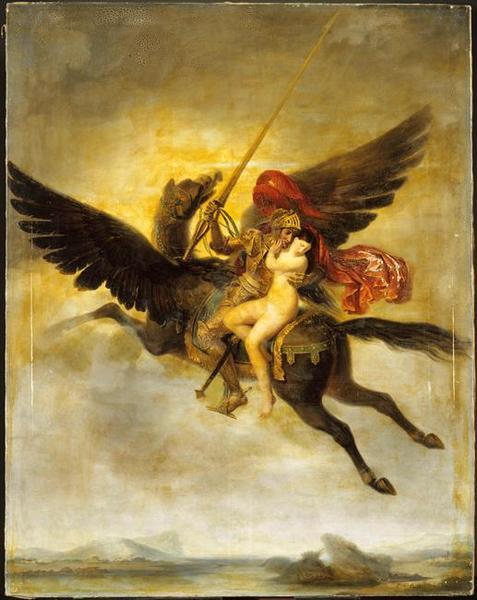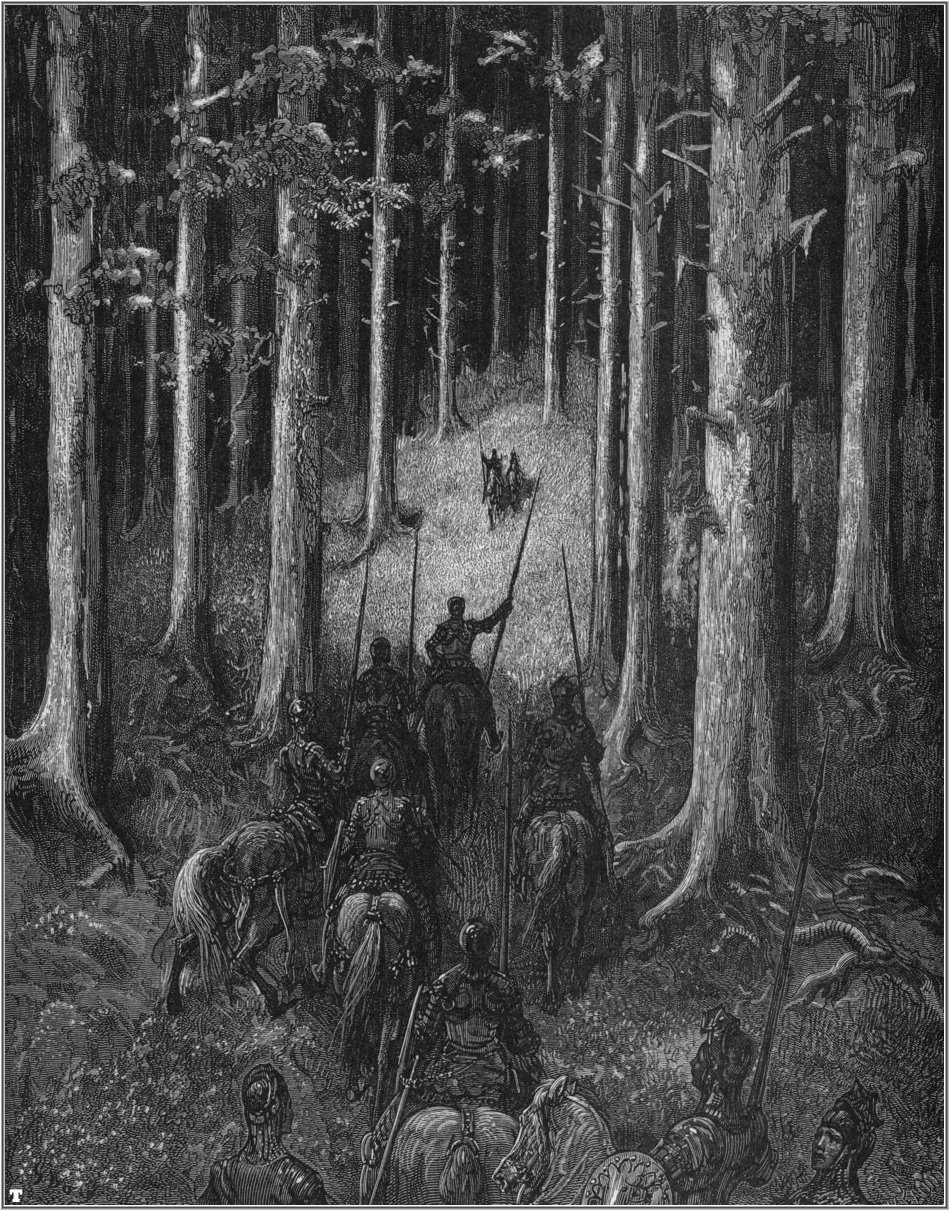|
Rogero
Ruggiero (often translated Rogero in English) is a leading character in the Italian romantic epics ''Orlando Innamorato'' by Matteo Maria Boiardo and ''Orlando Furioso'' by Ludovico Ariosto. Ruggiero had originally appeared in the twelfth-century French epic '' Aspremont'', reworked by Andrea da Barberino as the chivalric romance ''Aspramonte''.''The Cambridge History of Italian Literature'', Peter Brand and Lino Pertile, eds. Cambridge: Cambridge University Press, 1996, p. 168. In Boiardo and Ariosto's works, he is supposed to be the ancestor of Boiardo and Ariosto's patrons, the Este family of Ferrara, and he plays a major role in the two poems. Story He is the son of a Christian knight (Ruggiero II of Reggio Calabria, a descendant of Astyanax, son of Hector) and a Saracen lady (Galaciella, daughter of Agolant, king of Africa). When Ruggiero's father is betrayed and murdered, his mother escapes to the sea by boat, lands on the shores of Libya and dies after giving birth to twin ... [...More Info...] [...Related Items...] OR: [Wikipedia] [Google] [Baidu] |
Bradamante
Bradamante (occasionally spelled Bradamant) is a fictional knight heroine in two epic poems of the Renaissance: ''Orlando Innamorato'' by Matteo Maria Boiardo and ''Orlando Furioso'' by Ludovico Ariosto. Since the poems exerted a wide influence on later culture, she became a recurring character in Western art. In ''Orlando Innamorato'' and ''Orlando Furioso'' Bradamante, a female Christian knight in the service of Charlemagne, is the sister of Rinaldo and the daughter of Duke Amon, the duke of Dordognes. She falls in love with a Saracen warrior named Ruggiero, but she refuses to marry him unless he converts from Islam. An expert in combat, she wields a magical lance that unhorses anyone it touches, and rescues Ruggiero from being imprisoned by the wizard Atlantes. She is described as wearing white, with a white shield and a crest of a pennon. She is one of the French warriors fighting during a Saracen invasion into France. She is in the middle of fighting a Saracen warrior, ... [...More Info...] [...Related Items...] OR: [Wikipedia] [Google] [Baidu] |
Orlando Furioso
''Orlando furioso'' (; ''The Frenzy of Orlando'', more loosely ''Raging Roland'') is an Italian epic poem by Ludovico Ariosto which has exerted a wide influence on later culture. The earliest version appeared in 1516, although the poem was not published in its complete form until 1532. ''Orlando furioso'' is a continuation of Matteo Maria Boiardo's unfinished romance ''Orlando innamorato'' (''Orlando in Love'', published posthumously in 1495). In its historical setting and characters, it shares some features with the Old French '' Chanson de Roland'' of the eleventh century, which tells of the death of Roland. The story is also a chivalric romance which stemmed from a tradition beginning in the late Middle Ages and continuing in popularity in the 16th century and well into the 17th. Orlando is the Christian knight known in French (and subsequently English) as Roland. The story takes place against the background of the war between Charlemagne's Christian paladins and the Sa ... [...More Info...] [...Related Items...] OR: [Wikipedia] [Google] [Baidu] |
Jean-Auguste-Dominique Ingres
Jean-Auguste-Dominique Ingres ( , ; 29 August 1780 – 14 January 1867) was a French Neoclassical painter. Ingres was profoundly influenced by past artistic traditions and aspired to become the guardian of academic orthodoxy against the ascendant Romantic style. Although he considered himself a painter of history in the tradition of Nicolas Poussin and Jacques-Louis David, it is his portraits, both painted and drawn, that are recognized as his greatest legacy. His expressive distortions of form and space made him an important precursor of modern art, influencing Picasso, Matisse and other modernists. Born into a modest family in Montauban, he travelled to Paris to study in the studio of David. In 1802 he made his Salon debut, and won the Prix de Rome for his painting '' The Ambassadors of Agamemnon in the tent of Achilles''. By the time he departed in 1806 for his residency in Rome, his style—revealing his close study of Italian and Flemish Renaissance masters—w ... [...More Info...] [...Related Items...] OR: [Wikipedia] [Google] [Baidu] |
Reggio Calabria
Reggio di Calabria ( scn, label= Southern Calabrian, Riggiu; el, label= Calabrian Greek, Ρήγι, Rìji), usually referred to as Reggio Calabria, or simply Reggio by its inhabitants, is the largest city in Calabria. It has an estimated population of nearly 200,000 and is the twenty-first most populous city in Italy, after Modena, and the 100th most populated city in Europe. Reggio Calabria is located in the exact center of the Mediterranean and is known for its climate, ethnic and cultural diversity. It is the third economic centre of mainland Southern Italy. About 560,000 people live in the metropolitan area, recognised in 2015 by Italy as a metropolitan city. Reggio is located on the "toe" of the Italian Peninsula and is separated from the island of Sicily by the Strait of Messina. It is situated on the slopes of the Aspromonte, a long, craggy mountain range that runs up through the centre of the region. As a major functional pole in the region, it has strong historic ... [...More Info...] [...Related Items...] OR: [Wikipedia] [Google] [Baidu] |
Orc (monster)
An Orc (or Ork) is a fictional humanoid monster like a goblin. Orcs were brought into modern usage by the fantasy writings of J. R. R. Tolkien, especially ''The Lord of the Rings''. In Tolkien's works, Orcs are a brutish, aggressive, ugly, and malevolent race of monsters, contrasting with the benevolent Elves. There is a suggestion, among several somewhat contradictory origin stories, that they are a corrupted race of elves. Mythological monsters with names similar to "orc" can be found in the Old English poem ''Beowulf'', in Early Modern poetry, and in Northern European folk tales and fairy tales. Tolkien stated that he took the name from ''Beowulf''. The orc appears on lists of imaginary creatures in two of Charles Kingsley's mid-1860s novels. Tolkien's concept of orcs has been adapted into the fantasy fiction of other authors, and into games of many different genres such as ''Dungeons & Dragons'', '' Magic: The Gathering'', and ''Warcraft''. Etymology Old English ... [...More Info...] [...Related Items...] OR: [Wikipedia] [Google] [Baidu] |
Melissa (sorceress)
Melissa is a fictional good sorceress in the Matter of France. She is said to have been an apprentice of Merlin and guards his tomb, though she does not appear in older stories about him. In ''Orlando Furioso'', she is instrumental in the love affair of Ruggiero and Bradamante, whom she is determined will one day marry. Whenever their relationship is threatened, she brings them back together. Melissa conjures Ruggiero and Bradamante's descendants and foretells their futures. When Ruggiero has fallen victim to the enchantments of Alcina, she comes to his rescue by restoring his memory of his love for Bradamante, and releasing him from the spell which held him captive on Alcina's Isle. Later, Ruggiero loses a combat to determine who shall win the hand of Bradamante; despondent, he goes into the woods to starve himself to death. Melissa hears of his plight and reveals the truth to him: that he had lost in combat not to his rival, but to Bradamante herself; therefore, there is no rea ... [...More Info...] [...Related Items...] OR: [Wikipedia] [Google] [Baidu] |
Alcina
''Alcina'' (Händel-Werke-Verzeichnis, HWV 34) is a 1735 opera seria by George Frideric Handel. Handel used the libretto of ''L'isola di Alcina'', an opera that was set in 1728 in Rome by Riccardo Broschi, which he acquired the year after during his travels in Italy. Partly altered for better conformity, the story was originally taken from Ludovico Ariosto's ''Orlando furioso'' (like those of the Handel operas ''Orlando (opera), Orlando'' and ''Ariodante''), an epic poem. The opera contains several musical sequences with opportunity for dance: these were composed for dancer Marie Sallé. Performance history ''Alcina'' was composed for Handel's first season at the Royal Opera House#The first theatre, Theatre Royal, Covent Garden in London. It premiered on 16 April 1735. Like the composer's other works in the opera seria genre, ''Alcina'' fell into obscurity; after a revival in Braunschweig, Brunswick in 1738 it was not performed again until a production in Leipzig in 1928. The Au ... [...More Info...] [...Related Items...] OR: [Wikipedia] [Google] [Baidu] |
Hippogriff
The hippogriff, or sometimes spelled hippogryph ( el, Ἱππόγρυπας), is a legendary creature with the front half of an eagle and the hind half of a horse. It was invented by Ludovico Ariosto in his ''Orlando Furioso'', at the beginning of the 16th century. Within the poem, the hippogriff is a steed born of a mare and a griffin—something considered impossible. It is extremely fast and is presented as being able to fly around the world and to the Moon. It is ridden by magicians and the wandering knight Ruggiero, who, from the creature's back, frees the beautiful Angelica. Astolfo also borrows the hippogriff from Bradamante to go search for Roland's wits. Sometimes depicted on coats of arms, the hippogriff became a subject of visual art in the 19th century, when it was often drawn by Gustave Doré. Etymology The word ''hippogriff'', also spelled ''hippogryph'', is derived from the grc, ἵππος , meaning "horse", and the Italian ''grifo'' meaning "griffin" (from La ... [...More Info...] [...Related Items...] OR: [Wikipedia] [Google] [Baidu] |
Renaud De Montauban
Renaud de Montauban (; also spelled ''Renaut'', ''Renault'', Italian: ''Rinaldo di Montalbano'', Dutch: ''Reinout van Montalba(e)n'') was a legendary hero and knight which appeared in a 12th-century Old French ''chanson de geste'' known as ''The Four Sons of Aymon''. The four sons of Duke Aymon are Renaud, Richard, Alard and Guiscard, and their cousin is the magician Maugris (French: ''Maugis'', Italian: ''Malagi'', ''Malagigi''). Renaud possesses the magical horse Bayard and the sword Froberge (Italian: ''Fusberta'', ''Frusberta'', French: '' Flamberge''). The story of Renaud was popular across Europe. The tale was adapted into Dutch, German, Italian and English versions throughout the Middle Ages, inspired the Old Icelandic '' Mágus saga jarls'', and also incited subsequent sequels and related texts that form part of the Doon de Mayence cycle of ''chansons''. Renaud, as Rinaldo, is an important character in Italian Renaissance epics, including ''Morgante'' by Luigi Pulci, ... [...More Info...] [...Related Items...] OR: [Wikipedia] [Google] [Baidu] |
Orlando (character)
Roland (; frk, *Hrōþiland; lat-med, Hruodlandus or ''Rotholandus''; it, Orlando or ''Rolando''; died 15 August 778) was a Frankish military leader under Charlemagne who became one of the principal figures in the literary cycle known as the Matter of France. The historical Roland was military governor of the Breton March, responsible for defending Francia's frontier against the Bretons. His only historical attestation is in Einhard's ''Vita Karoli Magni'', which notes he was part of the Frankish rearguard killed in retribution by the Basques in Iberia at the Battle of Roncevaux Pass. The story of Roland's death at Roncevaux Pass was embellished in later medieval and Renaissance literature. The first and most famous of these epic treatments was the Old French '' Chanson de Roland'' of the 11th century. Two masterpieces of Italian Renaissance poetry, the ''Orlando Innamorato'' and ''Orlando Furioso'' (by Matteo Maria Boiardo and Ludovico Ariosto respectively), are even fur ... [...More Info...] [...Related Items...] OR: [Wikipedia] [Google] [Baidu] |
Rodomonte
Rodomonte (or Rodamonte) is a major character in the Italian romantic epic poems ''Orlando innamorato'' by Matteo Maria Boiardo and ''Orlando furioso'' by Ludovico Ariosto. He is the King of Sarza and Algiers and the leader of the Saracen army which besieges Charlemagne in Paris. He is in love with Doralice, Princess of Granada, but she elopes with his rival Mandricardo. He tries to seduce Isabella but she tricks him into killing her by mistake. In remorse, Rodomonte builds a bridge in her memory and forces all who cross it to pay tribute. When the "naked and mad" Orlando arrives at the bridge, it is Rodomonte, the pagan, who throws him into the river below. They both swim ashore, but Orlando who is naked and is unimpeded by heavy armor gets to the shore first. Finally, Rodomonte appears at the wedding of Bradamante and Ruggiero and accuses Ruggiero of treason for converting to Christianity and abandoning the Saracen cause. The two fight a duel and Rodomonte is killed. Rodomonte' ... [...More Info...] [...Related Items...] OR: [Wikipedia] [Google] [Baidu] |
Angelica (character)
Angelica is a princess in the epic poem ''Orlando innamorato'' by Matteo Maria Boiardo. She reappears in the saga's continuation, ''Orlando furioso'' by Ludovico Ariosto, and in various later works based on the two original ''Orlando'' pieces. The narratives are part of the Matter of France, a cycle of legendary history stories based on the adventures of Charlemagne and his paladins. ''Orlando Innamorato'' In ''Orlando Innamorato'', Angelica is introduced as the daughter of Galafrone, the king of "Cathay", or "China". But this seeming inconsistency can be resolved. Boiardo considered Cathay to be a city, and "Cathay was a city in India inferior or Serica" according to the Mappamondo Borgiano. She comes to Charlemagne's court with her brother Argalia (who assumes the identity of a knight named Uberto dal Leòne). (tr.), ''Orlando in Love'', I.i. and p. 671. note to I.i.25. All the knights are smitten with her, especially the cousins Orlando (Roland) and Rinaldo (Renaud), but ... [...More Info...] [...Related Items...] OR: [Wikipedia] [Google] [Baidu] |








